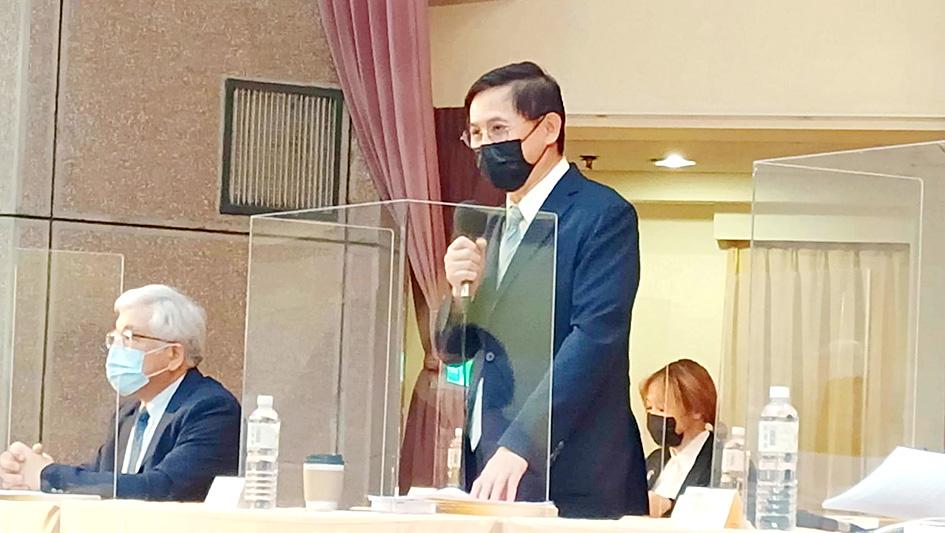Pegatron Corp (和碩), one of Apple Inc’s iPhone assemblers, yesterday said it is planning to expand manufacturing sites in Vietnam, India and North America to meet customer demand for production diversification, amid supply chain chaos attributable to the fallout of the COVID-19 pandemic.
The unpredictable effects of COVID-19 and unstable supply chains have increased uncertainty worldwide regarding consumer demand and the shipping of products, Pegatron said in its annual report.
“Pegatron will continue monitoring the supply of key components and working closely with its suppliers to optimize capacity allocations,” the company said.

Photo: Huang Hao-chen, Taipei Times
The remarks came as the firm held its annual general meeting in Taipei, where shareholders approved the distribution of a cash dividend of NT$5 per share.
That represented a payout ratio of 64.85 percent based on the company’s earnings per share of NT$7.71 last year.
Pegatron’s board of directors last month approved a plan to invest an additional US$50.61 million to expand its manufacturing hub in North America, the company said in a regulatory filing.
Pegatron said it had already planned to invest US$164 million on production lines in North America so that it could accommodate an increase in orders in the region.
The company has factories in Taoyuan, as well as operations in Mexico, Indonesia and the Czech Republic, while China is still its most important manufacturing hub, with factories in Kunshan, Suzhou, Shanghai and Chongqing.
Pegatron expects an increase in demand for information technology products, especially commercial PCs, as people gradually return to the office, the annual report said, adding that the launch of Microsoft Corp’s Windows 11 operating system would stimulate PC replacement demand.
As communications products, such as smartphones, are affected by seasonal cycles, Pegatron said it plans to boost production efficiency and improve management to navigate the industry’s ups and downs.
Last quarter, communication products were the biggest revenue contributor, accounting for 60 percent of total revenue, the company said.
This year, Pegatron expects its automotive electronics business to contribute more revenue, thanks to an increase in orders.

MULTIFACETED: A task force has analyzed possible scenarios and created responses to assist domestic industries in dealing with US tariffs, the economics minister said The Executive Yuan is tomorrow to announce countermeasures to US President Donald Trump’s planned reciprocal tariffs, although the details of the plan would not be made public until Monday next week, Minister of Economic Affairs J.W. Kuo (郭智輝) said yesterday. The Cabinet established an economic and trade task force in November last year to deal with US trade and tariff related issues, Kuo told reporters outside the legislature in Taipei. The task force has been analyzing and evaluating all kinds of scenarios to identify suitable responses and determine how best to assist domestic industries in managing the effects of Trump’s tariffs, he

TIGHT-LIPPED: UMC said it had no merger plans at the moment, after Nikkei Asia reported that the firm and GlobalFoundries were considering restarting merger talks United Microelectronics Corp (UMC, 聯電), the world’s No. 4 contract chipmaker, yesterday launched a new US$5 billion 12-inch chip factory in Singapore as part of its latest effort to diversify its manufacturing footprint amid growing geopolitical risks. The new factory, adjacent to UMC’s existing Singapore fab in the Pasir Res Wafer Fab Park, is scheduled to enter volume production next year, utilizing mature 22-nanometer and 28-nanometer process technologies, UMC said in a statement. The company plans to invest US$5 billion during the first phase of the new fab, which would have an installed capacity of 30,000 12-inch wafers per month, it said. The

Taiwan’s official purchasing managers’ index (PMI) last month rose 0.2 percentage points to 54.2, in a second consecutive month of expansion, thanks to front-loading demand intended to avoid potential US tariff hikes, the Chung-Hua Institution for Economic Research (CIER, 中華經濟研究院) said yesterday. While short-term demand appeared robust, uncertainties rose due to US President Donald Trump’s unpredictable trade policy, CIER president Lien Hsien-ming (連賢明) told a news conference in Taipei. Taiwan’s economy this year would be characterized by high-level fluctuations and the volatility would be wilder than most expect, Lien said Demand for electronics, particularly semiconductors, continues to benefit from US technology giants’ effort

‘SWASTICAR’: Tesla CEO Elon Musk’s close association with Donald Trump has prompted opponents to brand him a ‘Nazi’ and resulted in a dramatic drop in sales Demonstrators descended on Tesla Inc dealerships across the US, and in Europe and Canada on Saturday to protest company chief Elon Musk, who has amassed extraordinary power as a top adviser to US President Donald Trump. Waving signs with messages such as “Musk is stealing our money” and “Reclaim our country,” the protests largely took place peacefully following fiery episodes of vandalism on Tesla vehicles, dealerships and other facilities in recent weeks that US officials have denounced as terrorism. Hundreds rallied on Saturday outside the Tesla dealership in Manhattan. Some blasted Musk, the world’s richest man, while others demanded the shuttering of his